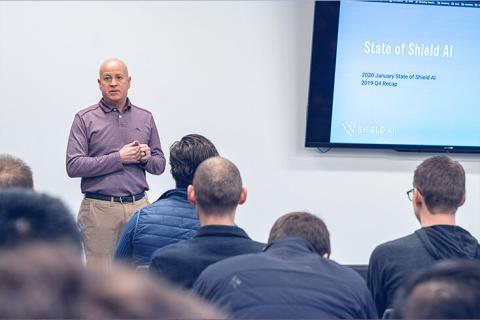What brought you to Shield AI?
I was drawn to Shield AI because of its fast growth and my belief that this is a company that wants to continue to grow and transform. I felt like my background of transforming other companies might be something Shield AI would be interested in. In addition, I found the mission to be extremely compelling and unique, and addressing a gap in the defense sector.
What do you think makes the defense sector different from other sectors?
The defense sector is very unique for a number of reasons. First and foremost, it is highly regulated and no matter how long you’ve been in the industry it’s always a challenge to maneuver the ever-changing politics, policy, and regulatory framework that governs doing business in the sector.
Second, the defense sector brings together unique combinations of talent. Shield AI is the perfect example of that — where else can you see a former Commander of Naval Special Warfare talking to a leading AI scientist, while a former NAVY Seal is talking to a corporate lawyer, while a tech entrepreneur is talking to a New York Times best-selling author? Here, I’ve met folks who have spent their entire careers in the sector and other folks who have never worked in the sector, but are equally accomplished in other industries. The defense sector has brought a lot of interesting, different, and accomplished people together at Shield AI to rally around a common goal. I have not seen that varied mix of people and backgrounds in other industries.
What advice have you received that remains with you today?
One of the best pieces of advice that I received early in my career that continues to shape my choices is to always pursue greatness in multiple things, even if you develop a single speciality. Not only will it help accelerate advancement in your specialty, it will broaden your opportunities.
This advice has driven me to challenge myself in different ways, to extend my skills beyond my core, to constantly put myself in environments where I will continue learning, to step outside my comfort zone, and to manage and lead different types of teams. I’ve become a much better lawyer and business executive by maintaining a focus on my core legal specialty, but also finding ways to expand my portfolio by running other functional areas like HR, Compliance, Communication, Public Affairs, Contracts, and more.
Expanding your professional range has the effect of widening your perspective. It allows you to view problems through multiple lenses. This results in finding creative solutions to problems in ways that others may not consider. This has opened up opportunities that I otherwise would not have had in my career if I had maintained a very singular focus.
Lawyers are known for skillfully navigating complicated disputes. When working on such projects, what skills do you draw upon to be successful?
The biggest challenges in a complicated deal or dispute are rarely the technical points; the biggest challenges are usually the atmospherics and strategic elements. Some of the most critical skills I have learned are:
Not to take things personally. Many people say it, very few live it, but acknowledging “it’s just business, it’s not personal” often saves you from unneeded stress and anxiety.
Choose your team wisely. No complicated transaction will close unless you have the right team from the beginning to the end. Choosing the right people to fill out your team has a tremendous impact on your ability to get things done.
Practice balance. Developing a healthy balance of urgency and patience is key. Knowing when to push is just as important as knowing when to walk away.
